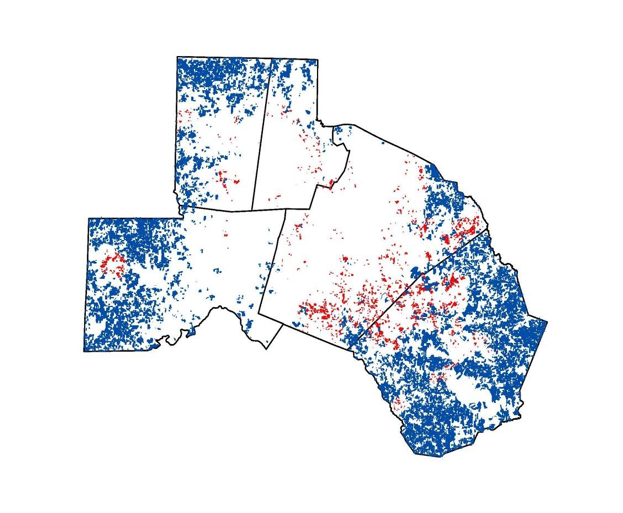CTNC and Triangle Land Conservancy (TLC) are helping to protect the land at Walnut Hill, a 410-acre property in Johnson and Wake Counties. TLC formally protects the land, while CTNC monitors the land in person to ensure that it is preserved in its initial, healthy state. This summer, four Stanback interns from CTNC visited Walnut Hill to conduct annual monitoring of the property. It’s a beautiful area, with plenty of forested areas and streams – natural lands like this are important for maintaining healthy wildlife populations and clean water. The visit provided a glimpse into the world of local wildlife, and how plant and animal species depend on each other.
Pollinators
Along the roads leading into Walnut Hill, pollinator species are immediately noticeable. Pollinators are animals – most often insects and birds – that move pollen between plants, helping the plants to reproduce. In this case, butterflies, moths, and bees are most commonly found on the roadside flowers.
Pollinators are crucial because many plants couldn’t reproduce without them. They also keep plant populations healthy by making sure they’re genetically diverse, meaning that if disease hits a group of plants, it’s less likely to wipe out the whole group since some of them can adapt and survive.
In North Carolina, common pollinators include swallowtail butterflies, bumblebees, honey bees, goldenrod soldier beetles, and ruby-throated hummingbirds.
Creeks & Streams
Streams are home to a huge variety of living things. In small waterways like this one, there may be small fish, frogs and toads, turtles, insects, and microscopic algae. Even more species may live nearby, including newts and salamanders, as well as special water-loving plants.
Activities upstream can have major impacts on streams like this, even miles away. When developed areas are highly paved, rainwater runs straight across the paved surfaces instead of filtering slowly into the ground. This causes the water to move quickly into nearby creeks and streams. It moves so quickly that it erodes the sides of the streams, causing sedimentation and damage to the habitat.
Forest Wildlife
Wildlife doesn’t just live in streams, though. Toads like this one, for example, can be found throughout the forest. Toads are amphibians, but some of the other animals we see most frequently are mammals and birds.
If you’ve ever been in a North Carolina forest, chances are you’ve seen white-tailed deer, an animal so common its populations can damage habitats because of the amount of plant matter they eat. Eastern cottontail rabbits are also native to the state, although they’re often harder to spot. Bats are sometimes found in forests, as they use hollow trees for shelter.
Birds are all around us whether we’re in the forest, city, or suburbs. The species of birds found in forests can be different from those in other areas, though, because the trees provide different feeding and roosting opportunities. Some of the more common forest birds include nuthatches, woodpeckers, warblers, and owls.
Plant Life
A forest is, of course, made up of plants. North Carolina is full of tree species like loblolly pine, hickory, live oak, and more. Walnut Hill contains both evergreen and hardwood trees, providing habitat for diverse species.
Walnut Hill also has some open fields, which are great locations for blackberries, raspberries, and milkweed. Tall grasses grow between these plants, along with shrubs and sometimes small trees. Many fields would eventually grow into forests if they didn’t experience frequent disturbance, such as mowing or fires. But fields like this provide valuable food and shelter for certain bird and insect species.





